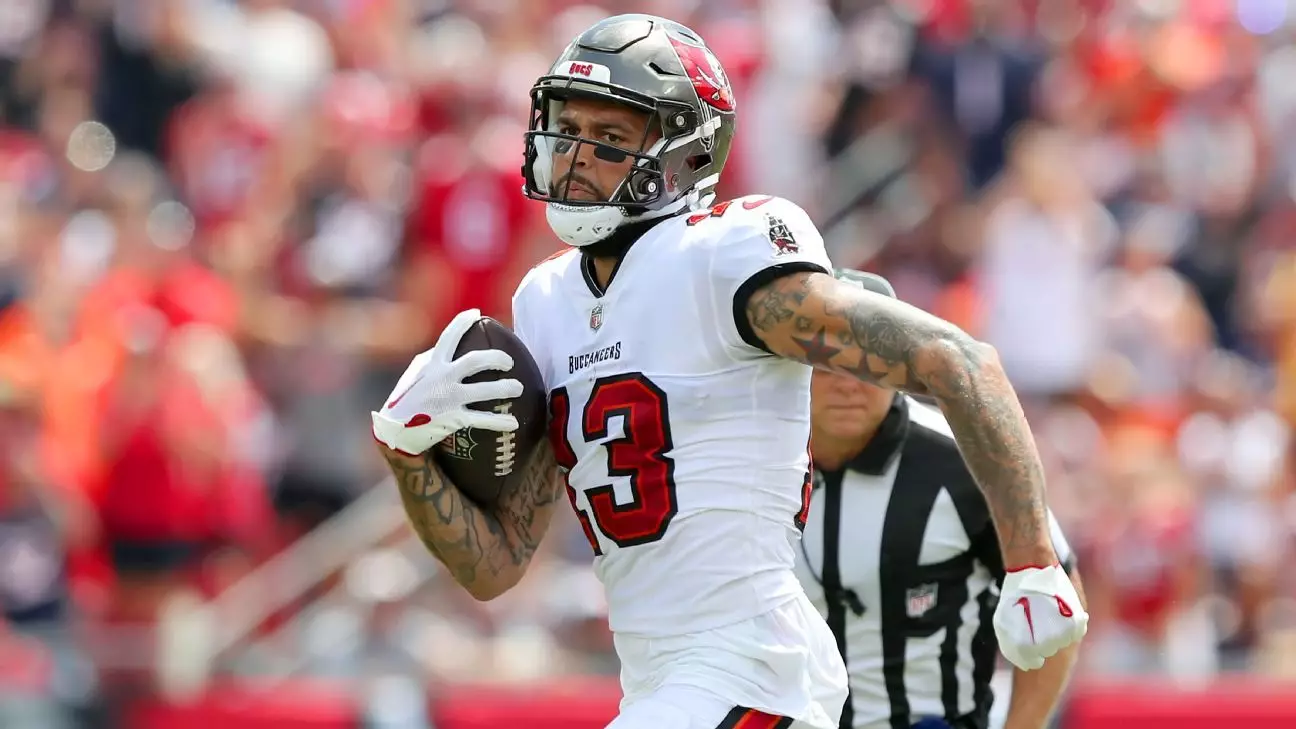In the world of professional sports, injuries can be as common as game-day jitters. The Tampa Bay Buccaneers’ wide receiver, Mike Evans, recently faced this stark reality when he suffered a moderate hamstring strain during a critical match against the Baltimore Ravens in Week 7. This injury led to Evans missing a total of three games—the longest absence of his impressive career. Observing his teammates struggle in closely contested games was a bitter pill for Evans to swallow. “It hurt to see your team out there fighting in really tough, close games that we could have won,” he admitted, showcasing the deep bond he shares with his teammates. Now, as he prepares to return against the New York Giants, anticipation and relief intertwine in his statements.
Evans has made significant strides in his recovery process. During a recent interview, he indicated that while he might have entertained an early return in Week 10 against the San Francisco 49ers, he chose to prioritize his long-term health. “This time off definitely helped me,” he reflected, underscoring his decision to take an extra week for conditioning rather than rush back into action. His statement reflects a mature understanding of the balance between competitiveness and personal health—an insight not all athletes possess.
Confidence is a crucial component in an athlete’s performance, and Evans appears to rekindle this essential quality through rigorous conditioning during the bye week. He disclosed that he had no worries about aggravating his injury; instead, he expressed optimism about his current state. “I feel really good,” he emphasized, revealing an upbeat demeanor that bodes well for him and his team. Such sentiments can uplift team morale, especially for the Buccaneers, who have struggled in Evans’ absence, losing four consecutive games. The gravity of Evans’ return cannot be overstated; he is not only the franchise’s all-time leading scorer, but he also embodies a vital emotional leader among his peers.
Yet, in an unexpected twist, Buccaneers head coach Todd Bowles has emphasized a cautious approach. “If he needs to be in there, he’ll be in there,” Bowles acknowledged, but he also made it clear that player health is of paramount importance. The caveat underscores the fine line coaches must tread: balancing the immediate need for skilled players while ensuring their long-term availability. The team’s current standing depends heavily on a recovery plan that puts health first—a perspective that has become increasingly recognized in modern sports.
As Evans gears up for his matchup against the Giants, he carries with him not just his team’s aspirations, but also a yearning to imprint his legacy into the annals of NFL history. Aiming to tie with the legendary Jerry Rice for the record of 11 consecutive 1,000-yard receiving seasons, the stakes are high for Evans. “It’s something that … obviously, I’m thinking about a lot of other people. I’m just thinking about winning—playing winning ball,” he articulated, combining ambition with the humility needed to prioritize collective goals over personal milestones. By focusing on team success, he illustrates a commendable example of leadership, one that young athletes can look up to.
The road ahead isn’t without challenges for Evans, who will need to average 95 receiving yards per game to reach that coveted milestone. He acknowledges the difficulty but refrains from letting it overshadow the commitment to winning. “Things will happen,” he stated, demonstrating a focus on the present rather than getting lost in the what-ifs.
As the Buccaneers face the downturn in performance with several injuries across their receiving corps, the return of Mike Evans shines a glimmer of hope. His recovery journey highlights not just personal resilience but also the importance of a supportive team environment. The bond shared between players, coupled with the insistence on prioritizing health over immediate talent deployment, epitomizes the evolution of how professional sports are approached today. With optimism and determination, Evans is poised to not only contribute to his team’s performance but also to leave a lasting legacy that transcends statistics. In embracing both the urgency of winning and the wisdom of recovery, Evans stands as a testament to the spirit of modern athletics.


Leave a Reply